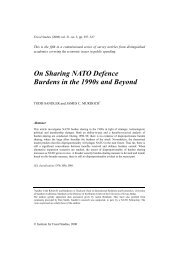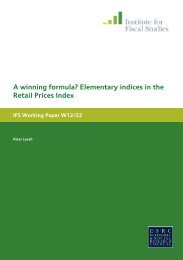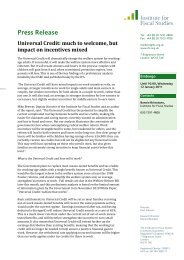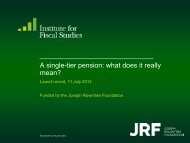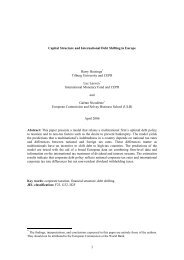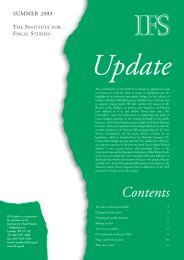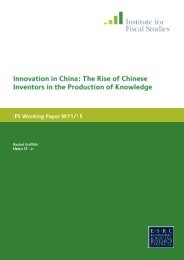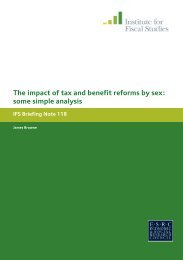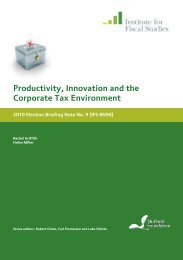A single-tier pension: what does it really mean? - The Institute For ...
A single-tier pension: what does it really mean? - The Institute For ...
A single-tier pension: what does it really mean? - The Institute For ...
You also want an ePaper? Increase the reach of your titles
YUMPU automatically turns print PDFs into web optimized ePapers that Google loves.
Proposed reforms<br />
received an average award of £53.75 (2013–14 earnings terms). 34 However, DWP<br />
estimates of take-up rates in 2009–10 indicate that only 62–68% of those ent<strong>it</strong>led<br />
to the <strong>pension</strong> cred<strong>it</strong> actually claimed <strong>it</strong> (implying that as many as 20–22% of 65-<br />
to 69-year-olds may have been ent<strong>it</strong>led to some element of the <strong>pension</strong> cred<strong>it</strong>). 35<br />
Figure 3.2 illustrates the current <strong>pension</strong> cred<strong>it</strong> (PC) system, showing for a <strong>single</strong><br />
person <strong>what</strong> their income would be including PC, based on their income w<strong>it</strong>hout<br />
PC. <strong>The</strong> solid black line shows the level to which PC tops up individuals’ incomes.<br />
<strong>For</strong> example, this shows that anyone w<strong>it</strong>h an income below £115.30 a week is<br />
eligible to receive PCGC to top up their income to £145.40. Individuals w<strong>it</strong>h<br />
slightly higher income than this are also eligible to receive some PCSC, which tops<br />
up their income further. <strong>The</strong> slope of the black line shows how much extra total<br />
income someone would receive (after taking into account <strong>mean</strong>s-tested <strong>pension</strong><br />
cred<strong>it</strong>) if their non-<strong>mean</strong>s-tested income were to increase by £1.<br />
Figure 3.2. How the <strong>pension</strong> cred<strong>it</strong> tops up <strong>pension</strong>er income<br />
Weekly <strong>pension</strong> income w<strong>it</strong>h <strong>mean</strong>stested<br />
benef<strong>it</strong>s in 2013–14 (£)<br />
220<br />
200<br />
180<br />
160<br />
140<br />
120<br />
Guarantee cred<strong>it</strong><br />
No <strong>mean</strong>s-tested benef<strong>it</strong>s<br />
Guarantee cred<strong>it</strong> and savings cred<strong>it</strong><br />
100<br />
100 110 120 130 140 150 160 170 180 190 200<br />
Weekly <strong>pension</strong> income (£; 2013–14 earnings terms)<br />
If a <strong>single</strong> individual has an income below £115.30 a week (that is along the<br />
horizontal portion of the black line), a £1 increase in non-<strong>mean</strong>s-tested <strong>pension</strong><br />
income will result in no change in total income, as their PCGC award will simply<br />
be reduced by £1 as well. Individuals expecting to be in this s<strong>it</strong>uation would have<br />
no incentive to save for retirement, as extra <strong>pension</strong> income would simply be<br />
offset one-for-one by loss of PCGC.<br />
If a <strong>single</strong> individual has non-<strong>mean</strong>s-tested income between £115.30 and<br />
£190.55, they will be eligible for some PCSC. <strong>For</strong> these people, a £1 increase in<br />
non-<strong>mean</strong>s-tested income would increase total income by 60p. Individuals<br />
34 Source: http://tabulation-tool.dwp.gov.uk/5pc/pc_prim/tabtool_pc_prim.html. Population<br />
estimates from 2010-based National Population Projections (ONS).<br />
35 Take-up rates for those eligible only for PCSC are estimated to be particularly low, at 43–48%.<br />
<strong>For</strong> these individuals, the <strong>pension</strong> cred<strong>it</strong> represents at most £18.06/£22.89 (<strong>single</strong>s/couples) of<br />
extra weekly income. Department for Work and Pensions, 2013f.<br />
23



